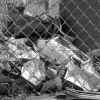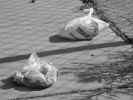dirty politics
 “Ignore
them and they’ll go away.” Isn’t that what your mother
used to tell you about schoolyard bullies?
“Ignore
them and they’ll go away.” Isn’t that what your mother
used to tell you about schoolyard bullies?
But we haven’t ignored the bullies at
the Examiner, and they haven’t gone away. Instead, they’ve
built on every nod and look we’ve given them,
manufacturing an urban crisis first downtown and now
citywide.
When will they learn that we’re tired of
their Mess on Market, their Turtle Supes, their PLUGs (every
one a plug for the Ex-paper), and most recently, their
Hooker Heaven (yeah, sure; tell that to your average sex
worker)?
San Francisco is — they tell us in front
page “news” stories and 14-point editorials — “in
tough shape.” What’s the solution? Literary mush: the
city must “get real about literal crime, and about the
figurative crime of our politics.”
Take a look at the San Francisco you know.
How closely does it jibe with the picture the Examiner has
been painting?
Start with “dirty streets.” Yes, there
are some. But not necessarily where you’d expect to find
them. A walk through the Tenderloin, for example, turns up
nearly immaculate sidewalks, thanks to the neighborhood’s
investment in a new sweeper. On the other hand, piles of
litter litter intersections in the Lower Haight and Inner
Mission, particularly in areas where young people congregate
and take-out food is plentiful.
Stroll down Market, near Old Navy. A young
man, dressed in the height of teen style, walks by, about to
dig into the hamburger he’s just bought. He whips off the
wrapper and drops it behind him. Next the pickle goes, then
the lettuce, and finally the tomato, all in a neat little
trail of garbage marking his progress. No one says a word.
In the same block, a woman hands out
flyers that advertise a nearby sale. Passersby politely take
her offerings, glance at them, and walk on, dropping the
bright pieces of paper on the sidewalk a few feet away. No
one says a word.
These miscreants are not homeless; they’re
not prostitutes or drug dealers. But yes, they’re making a
mess. And no one says a word.
Move away from the red herring of litter
and look at a couple of other examples.
A middle-aged, well-salaried professional
tells friends that he likes to spend his days off at a
multiplex, buying one ticket and seeing how many free movies
he can squeeze into an afternoon. No one says a word.
A father and his teenaged son stumble upon
a backpack containing a stack of credit cards, acollection
of Italian passports, and $110 in cash. He tells the son to
send the bundle off to the Italian consulate but to keep the
cash as a finder’s fee. When he mentions the incident to
acquaintances later, no one says a word.
No one says a word because, somewhere in
the upheavals of the past several decades, we have managed
to dull our sense of collective responsibility. Reports from
other parts of the country suggest that this is a national
condition, like a flu epidemic that leaves no city or hamlet
untouched. But the recent dot.com tornado that whirled
through San Francisco was particularly virulent, tossing out
tenants like trash at a ballpark. In the process, collective
— civic — responsibility became pretty thoroughly
numbed.
 But
not for long. One sign of local recovery was the election of
a group of anti–status quo supervisors last November. No
matter whether it’s Chris Daly we’re talking about, or
Tony Hall, or someone ideologically in between, they all
have taken it as their mandate to stop corruption and return
city government to the people who elected it.
But
not for long. One sign of local recovery was the election of
a group of anti–status quo supervisors last November. No
matter whether it’s Chris Daly we’re talking about, or
Tony Hall, or someone ideologically in between, they all
have taken it as their mandate to stop corruption and return
city government to the people who elected it.
The Examiner talks about garbage in the
streets. But the government of San Francisco is littered
with unsightly rocks, which the supervisors are turning over
and peering under, one by one. There are rocks labeled
Planning and Elections, some called the Airport and the
Port, and a whole heap known as Special Assistants. By
golly, there’s a big ugly toad under every one, grown fat
on personal privilege and a lack of accountability. Don’t
simply take the supes’ word for it. Ask HUD; ask our own
grand jury; ask the citizens of this city.
One by one, the supes are taking these
toads, swatting them on their fat behinds, and sending them
packing. In their place, they’re instituting some of the
most public-responsive measures ever seen in a large city.
Just ask the denizens of Soma and Mid-Market, who are
presently wrestling with real-life redevelopment plans,
hammering out each building proposal in countless community
meetings.
Into the midst of this civic bustle has
come the Ex-paper, riding an antiquated hobbyhorse. Why?
Simply to attract attention, boost sales, and ensure its
place as San Francisco’s second newspaper? To boost real
estate values, just in case things don’t work out and it
has to put its Mid-Market headquarters up for sale?
Or is a deeper political motivation at
work?
Here’s a thought: At the beginning of
its campaign the Examiner played no favorites, equally
indicting supes, D.A., and mayor for the mess on its
doorstep — an odd about-face for a publisher who once
paraded his admiration for Our Mayor, but perhaps a
necessary one to establish the new paper’s bona fides.
And since the advent of the new Board of
Supervisors, Our Mayor has lain mighty low, an odd activity
for one who loves the spotlight. But prudence perhaps
dictated his withdrawal, to avoid the crossfire of
accusations sweeping City Hall.
No longer, however, on either count. The
Ex-paper’s sites seem to have settled on the supes, and
Brown’s customarily ebullient presence has once again
begun to grace our public venues, with pointed comments in
response to the very crisis that the newspaper has stirred
up.
But not pointed toward the paper that did
the stirring. When Our Mayor proclaimed that San Francisco
is “not a dirty city,” he added, “if the San Francisco
Chronicle would do something about its own news racks on the
streets,” it would be a lot cleaner one. The Chronicle,
with some of the spiffiest racks in the city, not the
Examiner, with its defaced, trashed eyesores. Not the
Examiner, which is campaigning relentlessly against the new
Board of Supes.
There’s an old saying — the enemy of
my enemy is my friend.
Just a thought.
Here’s another one — caveat lector.
Let the reader beware.
Betsey Culp